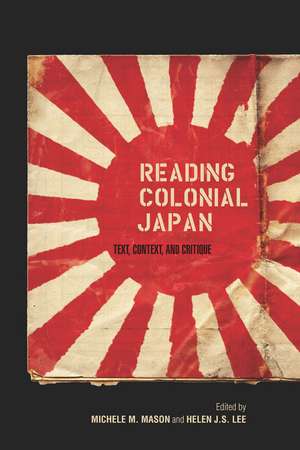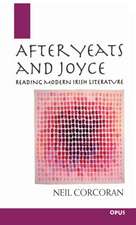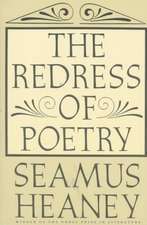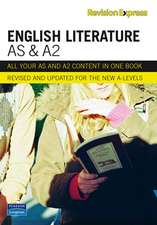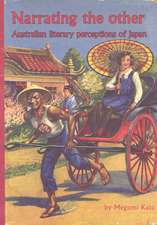Reading Colonial Japan: Text, Context, and Critique
Editat de Michele Mason, Helen Leeen Limba Engleză Hardback – 27 mar 2012
By any measure, Japan's modern empire was formidable. The only major non-western colonial power in the 20th century, Japan controlled a vast area of Asia and numerous archipelagos in the Pacific Ocean. The massive extraction of resources and extensive cultural assimilation policies radically impacted the lives of millions of Asians and Micronesians, and the political, economic, and cultural ramifications of this era are still felt today.
The Japanese empire lasted from 1869-1945. During this time, how was the Japanese imperial project understood, imagined, and lived? Reading Colonial Japan is a unique anthology that aims to deepen knowledge of Japanese colonialism(s) by providing an eclectic selection of translated Japanese primary sources and analytical essays that illuminate Japan's many and varied colonial projects. The primary documents highlight how central cultural production and dissemination were to the colonial effort, while accentuating the myriad ways colonialism permeated every facet of life. The variety of genres the explored includes legal documents, children's literature, cookbooks, serialized comics, and literary texts by well-known authors of the time. These cultural works, produced by a broad spectrum of "ordinary" Japanese citizens (a housewife in Manchuria, settlers in Korea, manga artists and fiction writers in mainland Japan, and so on), functioned effectively to reinforce the official policies that controlled and violated the lives of the colonized throughout Japan's empire.
By making available and analyzing a wide-range of sources that represent "media" during the Japanese colonial period, Reading Colonial Japan draws attention to the powerful role that language and imagination played in producing the material realities of Japanese colonialism.
The Japanese empire lasted from 1869-1945. During this time, how was the Japanese imperial project understood, imagined, and lived? Reading Colonial Japan is a unique anthology that aims to deepen knowledge of Japanese colonialism(s) by providing an eclectic selection of translated Japanese primary sources and analytical essays that illuminate Japan's many and varied colonial projects. The primary documents highlight how central cultural production and dissemination were to the colonial effort, while accentuating the myriad ways colonialism permeated every facet of life. The variety of genres the explored includes legal documents, children's literature, cookbooks, serialized comics, and literary texts by well-known authors of the time. These cultural works, produced by a broad spectrum of "ordinary" Japanese citizens (a housewife in Manchuria, settlers in Korea, manga artists and fiction writers in mainland Japan, and so on), functioned effectively to reinforce the official policies that controlled and violated the lives of the colonized throughout Japan's empire.
By making available and analyzing a wide-range of sources that represent "media" during the Japanese colonial period, Reading Colonial Japan draws attention to the powerful role that language and imagination played in producing the material realities of Japanese colonialism.
| Toate formatele și edițiile | Preț | Express |
|---|---|---|
| Paperback (1) | 174.55 lei 3-5 săpt. | |
| Stanford University Press – 27 mar 2012 | 174.55 lei 3-5 săpt. | |
| Hardback (1) | 646.60 lei 6-8 săpt. | |
| Stanford University Press – 27 mar 2012 | 646.60 lei 6-8 săpt. |
Preț: 646.60 lei
Preț vechi: 798.27 lei
-19% Nou
Puncte Express: 970
Preț estimativ în valută:
123.73€ • 132.31$ • 103.16£
123.73€ • 132.31$ • 103.16£
Carte tipărită la comandă
Livrare economică 18 aprilie-02 mai
Preluare comenzi: 021 569.72.76
Specificații
ISBN-13: 9780804776967
ISBN-10: 0804776962
Pagini: 320
Dimensiuni: 152 x 229 x 23 mm
Greutate: 0.52 kg
Ediția:New.
Editura: Stanford University Press
Colecția Stanford University Press
ISBN-10: 0804776962
Pagini: 320
Dimensiuni: 152 x 229 x 23 mm
Greutate: 0.52 kg
Ediția:New.
Editura: Stanford University Press
Colecția Stanford University Press
Recenzii
"Reading Colonial Japan is an anthology of finely written essays that squarely speaks to the burgeoning scholarship of 'multiple Japans' . . . [T]he anthology exhibits perceptive as well as theoretically- and historically-informed scholarship. The collection would appeal to scholars whose work straddles several disciplines as it places various forms of text in their historical contexts."—Ryota Nishino, New Zealand Journal of Asian Studies
"Reading Colonial Japan illuminates Japan's seven decades of colonial rule (1869–1945) through well-written translations of Japanese primary sources from the colonial era and related analytical essays . . . This monograph is an excellent contribution to the fields of Asian studies and post-colonial studies."—Elise Foxworth, Monumenta Nipponica
"Reading Colonial Japan is a splendid collection of colonial writings in translation, paired with critical essays that address historical and theoretical concerns in original and engaging ways. It is an exceptional achievement and a truly important addition to cultural studies, Asian studies, history, and the study of colonialism/postcolonialism, migration, and translation."—Sabine Frühstück, Professor of Modern Japanese Cultural Studies, University of California, Santa Barbara
Notă biografică
Michele M. Mason is assistant professor of Japanese literature at the University of Maryland, College Park. She is also the co-producer and interpreter for the short documentary film Witness to Hiroshima (2010). Helen J.S. Lee is an assistant professor of Japanese studies at the Underwood International College, Yonsei University, Seoul, Korea.
Descriere
Coupling translated primary texts from Japan's colonial era with critical interpretive essays by scholars in Japanese Studies, Reading Colonial Japan: Text, Context, and Critique illuminates the specificities of Japan's many and varied colonial projects and elucidates how the case of Japan, —the only major non-western colonial power—, can complicate and expand our knowledge of colonialism(s).
